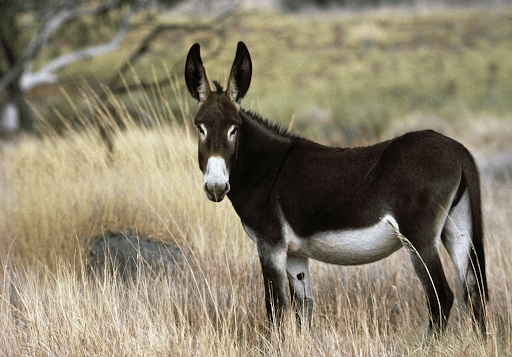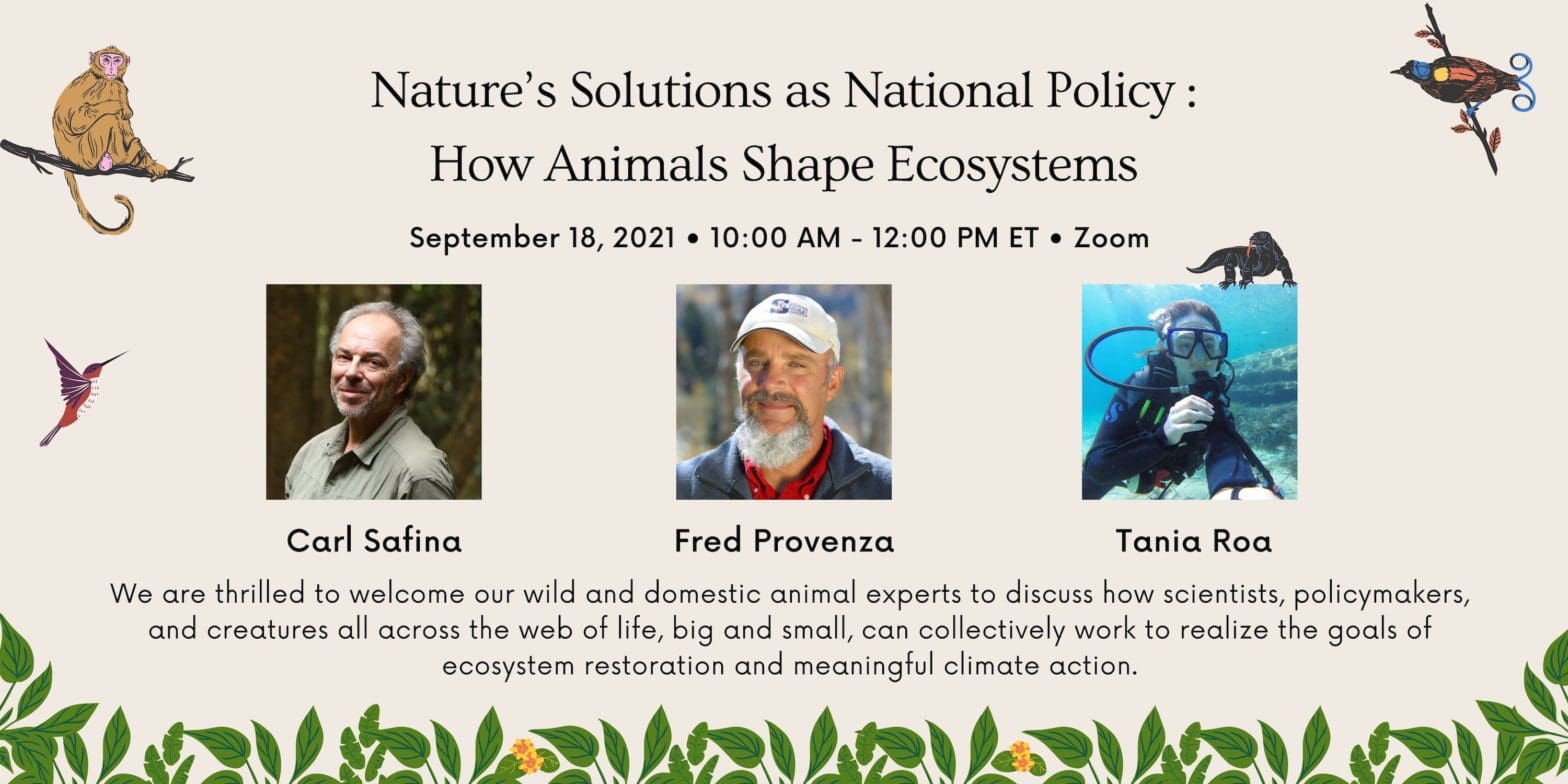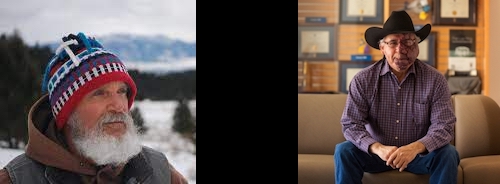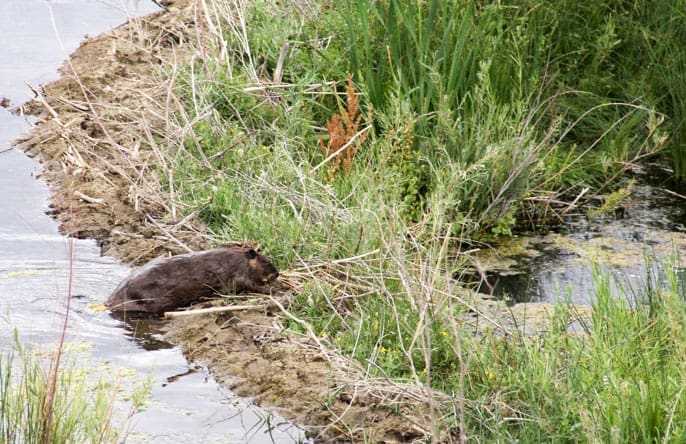Grass-fed beef producers in the U.S. have begun a movement to restore soils and stabilize the climate with a fundamentally different approach called regenerative grazing. This method builds on nature’s own system of pulling carbon from the air and storing it in the soil.
Sixty million buffalo lived on the Great Plains at one time. The prairie had deep, productive soils, 8 to 10 feet down, thanks to the symbiosis of the large herbivore, plants, photosynthesis and soil microbes. In more recent times, poor farming methods have sent this stored carbon back up into the atmosphere as C02.
Current scientific research helps us understand the mechanisms and methods by which grazing can foster carbon sequestration, protect against droughts and floods, and increase crop yields many-fold to feed growing populations.
Ridge Shinn founded Big Picture Beef in 2015. Its mission is to establish an environmentally sustainable and economically viable model of producing beef through managed grazing—no feedlots and no grain, ever. His vision is a system that produces healthy animals, healthy food, healthy soils, and fair wages for farmers.
This talk is part of our Life Saves the Planet Speaker Series in partnership with GBH Forum Network. Learn more about this series here: https://www.wgbh.org/forum-network/partners/biodiversity-for-a-livable-climate
#grassfed #farming #environment
Tag: ERAanimals
Reindeer, Beaver, And Healing Nature With Nature with Judith Schwartz & Ben Goldfarb
Our natural systems are under great stress. However, nature’s inclination is toward healing, and we can work with the logic of ecology to restore landscapes and waterways.
Biodiversity for a Livable Climate hosts authors Judith D. Schwartz and Ben Goldfarb as they talk about regenerating landscapes—and the pivotal role of animals in earth healing.
Judith’s book: “The Reindeer Chronicles and Other Inspiring Stories of Working With Nature to Heal the Earth”
Ben’s Book: “Eager: The Surprising Secret Life of Beavers and Why They Matter”
This talk is part of our Life Saves the Planet Speaker Series in partnership with GBH Forum Network. Learn more about this series here: https://www.wgbh.org/forum-network/partners/biodiversity-for-a-livable-climate
Learn more about Biodiversity for a Livable Climate: https://bio4climate.org/
Connect with us
Facebook: https://www.facebook.com/bio4climate
Twitter: https://twitter.com/bio4climate
Instagram: https://www.instagram.com/bio4climate/
#nature #wildlife #ecology
The Remarkable Success Of India’s Natural Farming Movement with Vijay Kumar & Didi Pershouse
Learn about a movement that grew from over 40,000 farmers in 2016 to almost 800,000 farmers in 2020 in one of the driest states in India. This work has been successful in part because of a community supported approach where women-run self help groups are in charge of operations.
Vijay Kumar, advisor to the government of Andhra Pradesh, presents this program, and the impact of Walter Jehne’s ideas for increasing drought resilience. Didi Pershouse, who accompanied Jehne on his trip to India, moderates the conversation.
This talk is part of our Life Saves the Planet Speaker Series in partnership with GBH Forum Network. Learn more about this series here: https://www.wgbh.org/forum-network/partners/biodiversity-for-a-livable-climate
Learn more about Biodiversity for a Livable Climate: https://bio4climate.org/
Connect with us
Facebook: https://www.facebook.com/bio4climate
Twitter: https://twitter.com/bio4climate
Instagram: https://www.instagram.com/bio4climate/
#farming #organic #india
Kachana Station: A Home for Donkey-led Restoration
In this interview hosted by Tania Roa, Chris Henggeler explains the holistic management practices occurring in Kachana Station, a landscape in northwestern Australia. Chris emphasizes the interconnectedness of humans across the globe, and our interconnectedness with other species. His call to action: help nature heal herself.
Learn more about Kachana Station: https://www.kachana-station.com/
Learn more about Biodiversity for a Livable Climate: https://bio4climate.org/
To read about our campaign supporting Kachana Station, visit our website: https://bio4climate.org/2021/10/23/kachana-station-a-home-for-donkey-led-restoration/
Zoom interview recorded September 2021
#biodiversity #ecosystem #holistic
Kachana Station: A Home for Donkey-Led Restoration
In northwestern Australia, far from roads or major cities, a herd of wild donkeys carries a valuable promise. This remote region is the Kimberley, home to Kachana Station, a family-owned holistically managed landscape. The Henggelers have overseen Kachana Station for decades, and their management techniques have brought benefits for the soil, wildlife, and local climate.
The Kimberley is notorious for bushfires. These scorching, widespread fires are now year-round threats—a scenario that’s becoming more common across Australia. Frequent fires make it hard for land to recover, leaving hardened, impenetrable dirt that repels moisture. Plants, animals, and the ground itself grow thirstier by the day, and wildlife struggles to survive. Yet, in what seems like a desolate, barren land, a curious, long-eared, often-misunderstood animal brings an unexpected source of hope.
Wild donkeys are transforming the landscape one hoof and nibble at a time. During searches for water, donkeys dig wells, surpassing the impenetrable dirt barrier and mixing nutrients underground. This process rehydrates the land, providing moisture for other species including beloved marsupials like the quoll, bilby, and rock wallaby; in the Kimberley, revitalization of soil creates a welcome oasis in an otherwise parched environment. The rehabilitation of soil means rainfall can become absorbed once again. With rain feeding the local area, fire frequency and intensity diminish, the temperature decreases, and life returns.
Once rain gets stored underground, the water in the soil goes through evapotranspiration, a process consisting of plants drawing water from the soil and releasing it into the atmosphere through vapor. The more water accessible for plant roots, the more water released into the air and absorbed by clouds. When wild donkeys dig and cycle nutrients, they are partaking in this process, therefore helping the ecosystem maintain the local water cycle. Donkeys also graze on vegetation that would otherwise dry out and become fire fuel. Reducing fuel loads and helping create moisture are the two main ways wild donkeys assist with land and fire management. As demonstrated by Kachana Station’s donkeys, biodiversity is the foundation for the revival of Earth’s ecosystems.
Respecting natural processes allows nature to heal herself, as she’s been doing for millennia. When nature heals, we heal. As more people suffer the effects of heat waves and water shortages, Kachana Station’s work demonstrates the promise of ecological restoration. What is scarce today can one day be abundant. What is lacking today can one day be overflowing. The determining factor is us: humans and the collective decisions we make.
Climate change and biodiversity loss are in large part consequences of our land management methods, but the trajectory we’re on doesn’t have to be our destiny. Soil, plants, and animals will return when given an opportunity. It’s our job to grant that chance by allocating natural resources to their rightful places. When we foster interactions between wildlife and Earth’s elements, we promote nature’s self-sustainability.
Learn more about the interactions between humans, animals, and plants:
To support Kachana Station’s research on the role non-native wild donkeys have in the Kimberley, Bio4Climate created a campaign to raise public awareness. We developed a petition, interviewed wildlife conservationist Dr. Arian Wallach, and interviewed Chris Henggeler to share the story of Kachana Station. Despite the evidence of the many benefits donkeys provide to other species and the local ecosystem, the Western Australian government is demanding that the Henggeler family kill the donkeys in their care or risk facing major fines. If this kill order goes into effect, Kachana Station’s restoration efforts will be set back, with lost opportunities for key insights on herbivores and fire management. Join our campaign by signing our petition and sharing this blog with your friends and family. Every signature counts. As Chris says, we’re all in this together.
Thanks to supporters like you, we at Bio4Climate have made a difference in Australia, and the people on the ground in Australia, including Dr. Arian Wallach and Chris, Bob, and Jacqueline Henggeler, have made a difference in the United States. Despite the distance between these two countries, we all have plenty in common. We are all facing urgent, life-threatening global challenges. More importantly, we all have the ability to take action. No matter where we live or where we come from, everyone can contribute to our planet’s restoration, and that is the ultimate source of hope.
To learn more about the land restoration work being done at Kachana Station, watch their video on “How to Heal Country.”
Written by Tania Roa
How Animals Shape Ecosystems with Carl Safina, Fred Provenza & Tania Roa
A panel discussion among author and ecologist Carl Safina, professor and author Fred Provenza, and wildlife advocate and writer Tania Roa. An insightful conversation on the interconnections between wild and domestic animal welfare, and a criticism of perspectives and policies related to other species.
Carl Safina earned a PhD in ecology from Rutgers University by studying seabirds. Afterwards, he spent a decade working to ban high-seas drift nets and to overhaul U.S. fishing policy. He has written many books on animals and the environment, including Song for the Blue Ocean and Becoming Wild: How Animal Cultures Raise Families, Create Beauty, and Achieve Peace. He hosted the PBS series Saving the Ocean, and continues to use his speaking skills to spread awareness for biodiversity conservation. He is now the first Endowed Professor for Nature and Humanity at Stony Brook University (where he formerly co-chaired the Alan Alda Center for Communicating Science), and he runs the not-for-profit Safina Center.
Fred Provenza is professor emeritus of Behavioral Ecology in the Department of Wildland Resources at Utah State University, where he worked for 35 years directing an award-winning research group that pioneered an understanding of how learning influences foraging behavior and links soil, plants, herbivores, and humans. He is one of the founders of BEHAVE, an international network of scientists, ranchers, farmers, and land managers committed to integrating behavioral principles with local knowledge. He authored Nourishment: What Animals Can Teach Us about Rediscovering Our Nutritional Wisdom and Foraging Behavior: Managing to Survive in a World of Change.
Tania Roa earned a Master of Science in Animals and Public Policy from Tufts University. She specialized in wildlife conservation and the connections between animal, human, and planet health. During the summer of 2020, her internship at World Animal Net gave her the opportunity to work with international animal welfare organizations and design digital campaigns urging the United Nations to include extensive biodiversity measures in their 2030 agenda for sustainable development. She uses her photography and writing to advocate for other species, climate justice, and adequate representation for historically marginalized communities.
This panel is part of our Nature’s Solutions as National Policy mini conference series. Learn more about this series here: https://bio4climate.org/conferences/natures-solutions-as-national-policy/
#wildlife #agriculture #animalwelfare
Changing the Field of Wildlife Conservation with Dr. Arian Wallach
In this interview hosted by Tania Roa, Dr. Arian Wallach discusses the importance of the wild donkey herd living in Kachana Station, a holistically managed landscape in northwestern Australia in a region called the Kimberley. Dr. Wallach discusses the importance of treating all living beings as sentient beings, and uses the wild donkeys as an example of the many benefits creatures bring to Earth’s ecosystems.
Learn more about Kachana Station: https://www.kachana-station.com/
Learn more about Biodiversity for a Livable Climate: https://bio4climate.org/
To support this campaign, please sign our petition urging the Western Australian government to retract their kill order, so the wild donkeys can continue living peacefully at Kachana Station: https://secure.avaaz.org/community_petitions/en/department_of_primary_industries_and_regional_deve_stop_the_killing_of_wild_donkeys_in_western_australia/?cRvWtnb&utm_source=sharetools&utm_medium=copy&utm_campaign=petition-1300824-stop_the_killing_of_wild_donkeys_in_western_australia&utm_term=cRvWtnb%2Ben
Zoom interview recorded on September 8, 2021
#animals #wildlife #conservation
Nature’s Solutions as National Policy: How Animals Shape Ecosystems
Carl Safina, Fred Provenza, and Tania Roa joined us for Bio4Climate’s second mini-conference of 2021 on implementing nature’s solutions in climate policy. The video recording is available here.
How Culture Links Animals and Landscapes
Fred Provenza and Ninna Piiksii joined our Life Saves the Planet lecture series to discuss animals, their intelligence and culture, and the way human attitudes toward food can be enriched by expanding our sources of wisdom. Read more on our WGBH page.
Beavers, the Master Water Engineers
Climate Restoration Solutions – Leave it to Beavers! Learn how beavers can help restore wetlands, which have one of the greatest potentials to restore habitats and sequester carbon. Check out Eager! by Ben Goldfarb.
Nature’s Solutions as National Policy with Walter Jehne, Vijay Kumar & Rep. Chellie Pingree
A panel discussion among Walter Jehne, Climate and Soil Scientist; Vijay Kumar, government advisor for the Andhra Pradesh Community Managed Natural Farming Movement; and Chellie Pingree, Congresswoman from Maine and organic farmer. A remarkable look at the potential future of farming.
This discussion took place June 5, 2021 and is the first installment in a conference series focused on environmental policy and hosted by Biodiversity for a Livable Climate.
Learn more about Biodiversity for a Livable Climate: https://bio4climate.org/
#regenerativefarming #soilscience #government
The Environmental Benefits of Grass Fed Beef
Ridge Shinn, cattle farmer and founder of Big Picture Beef, joined our Life Saves the Planet lecture series on GBH Forum Network. He discussed how grazing can help build healthy soil, sequester carbon, and lead to agricultural systems that improve environmental health and farmers’ livelihoods over time. Read more and view the recording here!
The Remarkable Success of Community Managed Natural Farming in Andhra Pradesh
Vijay Kumar and Didi Pershouse joined our Life Saves the Planet series to speak on community managed natural farming in Andhra Pradesh, India and the hopeful prospects of regenerative farming for the future of our planet. Watch the video.
Reindeer, Beaver, and Healing Nature With Nature
First talk in our GBH Forum Network series, Life Saves the Planet, with author Judy Schwartz discussing her new book, Reindeer Chronicles. Watch the video.
Soak Up the Rain with Jan Lambert
This workshop follows Jan’s talk: Soak Up the Rain! What We Can All Do to Reduce Drought, Floods, Heat Waves and Severe Storms
Jan Lambert: environmental writer and editor of The Valley Green Journal
Learn more about Biodiversity for a Livable Climate: https://bio4climate.org/
Connect with us
Facebook: https://www.facebook.com/bio4climate
Twitter: https://twitter.com/bio4climate
Instagram: https://www.instagram.com/bio4climate/
Presented at Blessed Unrest conference via online, extending across weekends in April & May of 2020
#rain #floods #storms
Soak Up the Rain! What We Can Do to Reduce Drought, Floods, Heat Waves & Severe Storms: Jan Lambert
Did you ever stop to think about what happens with all the water that goes down the storm drains in your town or city every time it rains? Jan Lambert, even though a lifelong nature advocate, never gave that question much thought until 2014, when as an environmental journalist she learned about the profound and central role of the natural water cycle in regulating and moderating each region’s climate. It is not at all hard to understand how humans, by interfering with the natural flow of water through landscapes and the atmosphere, have damaged both land and climate. The good news is that by making some simple changes, we can restore the natural life-giving flow of water. It may surprise you to learn that it’s not how much water we use, but what happens after we use it, that really matters.
Jan Lambert: environmental writer and editor of The Valley Green Journal
Learn more about Biodiversity for a Livable Climate: https://bio4climate.org/
Connect with us
Facebook: https://www.facebook.com/bio4climate
Twitter: https://twitter.com/bio4climate
Instagram: https://www.instagram.com/bio4climate/
Presented at Blessed Unrest conference via online, extending across weekends in April & May of 2020
#drought #floods #heatwaves
Jon Way: The Many Lives of The Changing Coyote
Relatively little is known about the fascinating coyotes in the east It is a remarkable animal, being one of the only carnivores to actually increase its range and distribution in the past one hundred years. Coyotes have taken over as top predator in all environments in New England, from wilderness parks to city greenbelts. Along its migration to the northeast it has become larger, likely the product of hybridization between western coyotes and eastern wolves. Jon’s work celebrates having these animals living among us and makes a passionate plea for their protection
Jon Way’s main interest is the study of predators inhabiting urbanized ecosystems, especially the coyote. His book is Suburban Howls.
Presented at Climate, Biodiversity, and Survival: Listening to the Voices of Nature conference at Harvard University on November 17-18, 2018
Learn more about Biodiversity for a Livable Climate: https://bio4climate.org/
Connect with us
Facebook: https://www.facebook.com/bio4climate
Twitter: https://twitter.com/bio4climate
Instagram: https://www.instagram.com/bio4climate/
#coyote #predators #animals
Charles Chester: A Panorama of Bats
Learn more about Biodiversity for a Livable Climate: https://bio4climate.org/
Please donate to our ecosystem restoration work: https://bio4climate.org/donate/
Almost a quarter of all mammal species are bats. Some consume insects, others pollinate a wide range of plants, and some are highly effective seed dispersers in tropical rainforests. In sum, they provide people and the planet with key ecosystem services. But they also face a range of threats—a list that begins with fear and misconception, then scrolls down through habitat loss, disease, climate change, and too many more. The good news is that we have proven conservation solutions for most problems, and scientists are working on a host of innovative responses to some of the more perplexing challenges.
Charles C. Chester teaches global environmental politics at Brandeis University and at the Fletcher School of Tufts University. He serves on the board of Bat Conservation International and is Chair of the Yellowstone to Yukon Conservation Council.
Presented at Climate, Biodiversity, and Survival: Listening to the Voices of Nature conference at Harvard University on November 17-18, 2018
#bats #mammals #ecosystemservices
Jim Laurie & His Homeschool AP Biology Students: Nature Wants to Be Wet
Learn more about Biodiversity for a Livable Climate: https://bio4climate.org/
Please donate to our ecosystem restoration work: https://bio4climate.org/donate/
Restoration ecologist Jim Laurie illuminates the vital connections between water cycles and biodiversity, describing numerous keystone species – from microbes and worms to beavers, burrowing animals and ruminants – which increase water infiltration and retention in landscapes. By partnering with these species we can jumpstart the restoration of stable local water cycles. Jim also introduces students from his Homeschool Advanced Placement Biology / Restoration Ecology course who perform a short play called “Symbiosis”, including sketches on “Making Holes to Improve the Small Water Cycle” and “Stopping Flash Floods and Cleaning Water.” Jim will finish with a brief description of a new initiative in state government: since 2009 the Mass. Division of Ecological Restoration has helped partners remove 40 dams and restore approximately 2,000 acres of coastal wetland.
Presented a Biodiversity for a Livable Climate’s “Restoring Water Cycles to Reverse Global Warming” conference October 16th-18th, 2015 at Tufts University.
#biological #ecology #watercycles

















